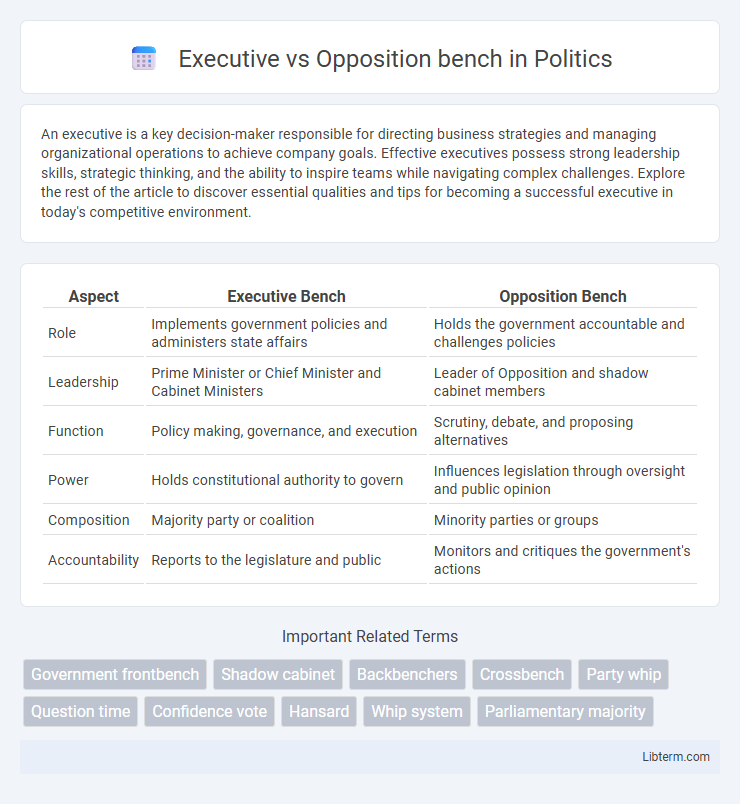An executive is a key decision-maker responsible for directing business strategies and managing organizational operations to achieve company goals. Effective executives possess strong leadership skills, strategic thinking, and the ability to inspire teams while navigating complex challenges. Explore the rest of the article to discover essential qualities and tips for becoming a successful executive in today's competitive environment.
Table of Comparison
| Aspect | Executive Bench | Opposition Bench |
|---|---|---|
| Role | Implements government policies and administers state affairs | Holds the government accountable and challenges policies |
| Leadership | Prime Minister or Chief Minister and Cabinet Ministers | Leader of Opposition and shadow cabinet members |
| Function | Policy making, governance, and execution | Scrutiny, debate, and proposing alternatives |
| Power | Holds constitutional authority to govern | Influences legislation through oversight and public opinion |
| Composition | Majority party or coalition | Minority parties or groups |
| Accountability | Reports to the legislature and public | Monitors and critiques the government's actions |
Introduction to Parliamentary Benches
Parliamentary benches represent the physical arrangement of legislators within a parliamentary chamber, with the Executive bench reserved for members of the ruling government, including the Prime Minister or Chief Minister and their cabinet. The Opposition bench is occupied by members not supporting the government, tasked with scrutinizing and challenging government policies and legislation. This spatial division underscores the functional dynamics of parliamentary democracy, fostering debate and accountability.
Defining the Executive Bench
The Executive Bench in a parliamentary setting consists of members who hold key positions in the government, including the Prime Minister, Cabinet Ministers, and other appointed officials responsible for policy-making and administration. This bench is distinguished from the Opposition Bench, which is composed of members who challenge, scrutinize, and provide alternatives to government policies. The Executive Bench plays a central role in steering legislative agendas and implementing government decisions within the parliament.
Understanding the Opposition Bench
The Opposition Bench plays a crucial role in parliamentary democracy by holding the Executive accountable through rigorous debate and scrutiny of government policies. Members of the Opposition bench, often representing various political parties not in power, challenge legislation to ensure transparency and prevent misuse of authority. Their function strengthens the legislative process by offering alternative viewpoints and fostering constructive criticism essential for balanced governance.
Roles and Responsibilities of the Executive
The Executive bench, comprising the Prime Minister, Cabinet Ministers, and other government officials, holds the primary responsibility for policy formulation, implementation, and administration of government affairs. They execute laws, manage public resources, and represent the state in domestic and international matters. The Executive's role contrasts with the Opposition bench, which scrutinizes, challenges, and holds the government accountable to ensure transparency and uphold democratic processes.
Functions and Duties of the Opposition
The Opposition bench plays a critical role in a parliamentary democracy by scrutinizing the policies and actions of the Executive to ensure transparency and accountability. It performs the function of constructive criticism by debating government proposals, raising public issues, and offering alternative policies. The Opposition also safeguards democratic rights by challenging any misuse of power, thereby strengthening the legislative process and maintaining a healthy balance between governance and dissent.
Key Differences Between Executive and Opposition
The Executive bench consists of members who hold key government positions responsible for policy implementation and governance, whereas the Opposition bench comprises members who challenge and scrutinize government actions. The Executive drives legislative agendas and enforces laws, while the Opposition provides alternative viewpoints and holds the Executive accountable. These roles create a balance of power essential for democratic functioning.
Importance of Parliamentary Balance
Maintaining a clear distinction between the Executive and Opposition benches is crucial for ensuring effective parliamentary democracy, as it facilitates accountability and transparent governance. The Executive, composed of ruling party members, formulates policies and implements laws, while the Opposition scrutinizes these actions, offering alternative viewpoints and holding the government accountable. This balance between the benches sustains a healthy legislative process, prevents authoritarianism, and strengthens democratic institutions.
Challenges Faced by Both Benches
The Executive bench often grapples with maintaining efficient governance amid bureaucratic hurdles and public scrutiny while implementing policies. The Opposition bench faces challenges in effectively holding the government accountable, balancing criticism with constructive debate, and overcoming limited access to information. Both benches struggle under the pressure of polarized political environments that hinder collaborative legislative progress.
Impact on Legislative Processes
The Executive bench, composed of government ministers, drives legislative agendas by proposing bills and policies, significantly influencing the direction and pace of lawmaking. The Opposition bench provides critical scrutiny and alternative viewpoints, often challenging the Executive's proposals to ensure accountability and transparency. This dynamic interplay between the Executive and Opposition benches shapes the robustness and effectiveness of parliamentary debates, ultimately impacting policy outcomes and democratic governance.
Conclusion: Executive and Opposition Collaboration
Effective governance relies on dynamic collaboration between the Executive and Opposition benches, fostering balanced policy-making and democratic accountability. Constructive dialogue and mutual respect enable the integration of diverse perspectives, enhancing legislative quality and public trust. Sustained cooperation between both entities strengthens institutional stability and promotes inclusive political progress.
Executive Infographic

 libterm.com
libterm.com